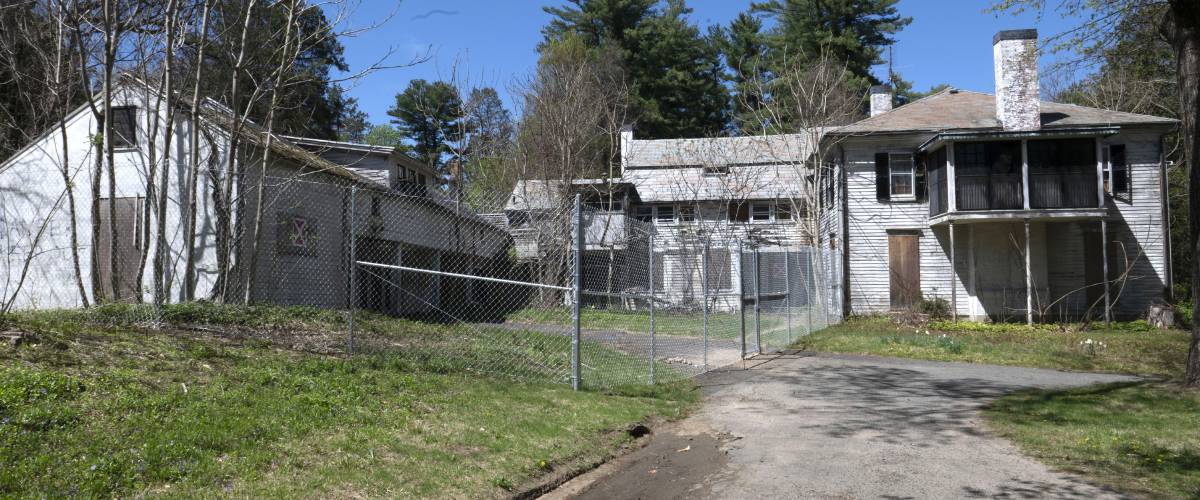My Turn: How wealth and privilege prevent much-needed housing

The Dakin Estate owned by Amherst College at 355 South Pleasant St. STAFF PHOTO/CAROL LOLLIS
| Published: 05-15-2025 12:53 PM |
Amherst College blithely contributed to the housing shortage in Amherst. That was the takeaway of a recent Gazette article about the liberal arts college’s request to demolish two historic properties, which, according to the article, was purchased to prevent a housing development by outbidding private housing developers with $4.3 million in 2003. It’s an astonishing case of wealth and privilege preventing the construction of much-needed housing, regardless of the detriment to others, while irresponsibly allowing two historic homes to fall into a state of disrepair.
The irony is that the housing policy of liberal communities is more exclusionary than that of conservative ones, a disappointing hypocrisy among those who portray themselves as champions of inclusion and equality. Research by those who study housing policy have proven this is the case.
For example, Yale property law scholar Robert Ellickson demonstrated the exclusionary tendencies of liberal communities by using Yale’s Greater New Haven Area, Silicon Valley and Austin,Texas as case studies in “America’s Frozen Neighborhoods: The Abuse of Zoning.” And Richard Kahlenberg, a lecturer at George Washington University’s Trachtenbert School of Public Policy and Public Administration, also noted the liberal penchant for housing discrimination through zoning bylaws in, “Excluded: How Snob Zoning, Nimbyism, and Class Bias Build The Walls We Don’t See.”
In Kahlenberg’s prologue, he states: “Highly educated liberals who are admirably concerned with inequality by race, gender, and sexual orientation nevertheless often support polices that tell working people that they are unwelcome in a neighborhood unless they can afford a single family home, sometimes on a half-acre lot.”
Or, as the highly educated liberals at Amherst College revealed with an expenditure of $4.3 million, no housing is preferable near them, regardless of the size of the lot.
As a non-profit, the college is largely exempted from paying property taxes, which has the effect of increasing the tax liability of local homeowners. What it does pay to the town in lieu of taxes is a fraction of what it should pay. It also has a $4.31 billion endowment as of the end of the 2024 fiscal year. Amherst College weaponized its significant wealth and tax advantage to prevent a housing development, which the Gazette reported had the potential for 30 single-family homes or 50 condominiums. If the liberal town’s zoning wasn’t so exclusionary, there could have also been multi-family homes in the mix for even more housing. And yes, there also was a housing shortage when they bought the property.
“Amherst is proud of its work to recruit, admit, and enroll a diverse student body,” the college’s Diversity, Equity & Inclusion statement on its websites states. “We’re dedicated to creating a sense of belonging in our close-knit community.”
Yet buying a property for the sole purpose of blocking any inclusion due to its proximity demonstrates the abject hypocrisy of Amherst College.
Article continues after...
Yesterday's Most Read Articles
 A comforting craft: Greenfield knitting circle donates to hospital, police and school
A comforting craft: Greenfield knitting circle donates to hospital, police and school
 The hot new spot in Shelburne Falls: Hotfire Bar and Grill feels in many ways like a home kitchen
The hot new spot in Shelburne Falls: Hotfire Bar and Grill feels in many ways like a home kitchen
 New Whately highway superintendent settles in
New Whately highway superintendent settles in
 Amid dwindling membership, Northfield Kiwanis Club to dissolve
Amid dwindling membership, Northfield Kiwanis Club to dissolve
 Grants to illuminate Massachusetts history for Revolution’s 250th anniversary
Grants to illuminate Massachusetts history for Revolution’s 250th anniversary
 MassDEP to handle First St. cleanup in Turners Falls; site slated for affordable housing
MassDEP to handle First St. cleanup in Turners Falls; site slated for affordable housing
That hypocrisy isn’t limited to Amherst College. It’s evident among liberal communities locally and nationally. Many local efforts to prohibit housing through conservation are often celebrated on the pages of this newspaper. Those articles are often about land trusts voters didn’t elect creating additional housing restrictions beyond the usual exclusionary zoning rules by partnering with private landowners. This is not to say that conservation doesn’t have its place however.
Efforts to prohibit housing also has economic consequences for communities. The annual complaints about lack of funding for our schools, pockmarked roads, and deteriorating bridges can be addressed with more housing increasing the tax base, instead of solving these challenges by increasing the tax burden of existing property owners with budgetary band-aids like Proposition 2½.
The penchant to prohibit the needed types of housing in liberal communities is usually framed as necessary for health, safety, and welfare, but that is a disingenuous claim. It is patently immoral to pursue housing prohibitions in the midst of a shortage. Liberal communities should be the example of inclusion, not an exception. But that is exactly what has happened, and it will take bold action by elected officials to change course and meet the housing needs of the populous.
Michael Seward is a real estate broker who lives in Sunderland.






 Pushback: Spending locally builds a stronger Greenfield ‘ecosystem’
Pushback: Spending locally builds a stronger Greenfield ‘ecosystem’ Guest columnist William Lambers: What you can do about nuclear weapons — 80 years after Trinity blast
Guest columnist William Lambers: What you can do about nuclear weapons — 80 years after Trinity blast Larkin Pazanova: A spotting of the spotted lanternfly
Larkin Pazanova: A spotting of the spotted lanternfly Jim Bates: Elitists seek control, pursue overreach
Jim Bates: Elitists seek control, pursue overreach
